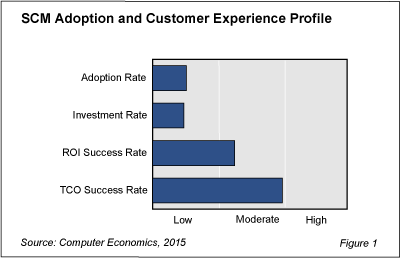Competitive pressures, globalization and increasingly complex offshore manufacturing relationships are spurring organizations to expand their supply chain management systems, which encompass a wide variety of technologies and capabilities.
According to the findings of our report, Supply Chain Management Adoption and Customer Experience, organizations that have implemented SCM technology have moderate success in achieving return on investment. At the same time, newer cloud-based solutions are making it cost-effective for smaller and midsize companies to join their larger peers in adopting the technology.
SCM technology providers offer increasingly sophisticated capabilities at price points that encourage further adoption by companies of all sizes. But as with all business applications, adopters must carefully manage the total cost of ownership to ensure that ROI targets are achieved. The complexity of these applications, combined with the need to change business processes, mean that organizations will need to focus on change management to realize SCM benefits.
Figure 1 compares the adoption, investment, ROI and TCO rates of SCM systems against the rates for 14 other technologies commonly used in business and included in our annual Technology Trends study.

Based on the survey, each of the technologies receives numerical ratings on the levels of adoption, investment, ROI, and TCO. Then we categorize each technology as having low, moderate, or high rates relative to other technologies in the survey. Here are the top-line findings:
-
Adoption Rate: SCM adoption is low compared with other technologies in the study. That means the percentage of organizations that have SCM solutions in place is within the bottom one-third of the range, defined by the technologies with the highest and lowest adoption rates in the study. It does not include organizations that have plans to implement the technology for the first time but have not yet done so. The low adoption rate for SCM is largely due to the fact that this technology does not have widespread application in some industry sectors, such as financial services or information services.
-
Investment Rate: The percentage of organizations investing in SCM technology likewise earns a low rating. Investors include organizations that plan new implementations or enhancements to existing systems within the next 18 months. Once again, the relatively low investment rate is because the technology does not have relevance in some business sectors.
-
ROI Success Rate: Among organizations that have adopted SCM, the experience is positive, but not spectacular. SCM has a moderate ROI success rate. The percentage of organizations at least breaking even on their investments within a two-year period is at the low end of the middle range when compared with other technologies surveyed.
- TCO Success Rate: However, compared with the other technologies covered in the survey, the TCO success rate for SCM is relatively positive, especially when vs. other enterprise applications, where there is often a danger of underestimating. We define TCO success as actual costs maintained at or less than budget.
Interestingly, the TCO success rate is more positive than the ROI success rate, which is unusual for business applications in general. This indicates that organizations are getting better at controlling the costs of SCM implementation. This may be due to the fact that cloud deployment of SCM applications is becoming more popular, which reduces some of the deployment burden and increases the predictability of costs under subscription plans.
Based on the survey, the full report quantifies the current adoption and investment trends for SCM systems as well as the benefits driving companies to expand their SCM implementations. We assess these trends by organization size, sector, and geography. In terms of economics, we look at the ROI and TCO experience of those that have adopted SCM along with current investment per SCM user. We conclude with practical advice for those considering investment in SCM technology.
This Research Byte is a brief overview of our report on this subject, Supply Chain Management Adoption Trends and Customer Experience. The full report is available at no charge for Computer Economics clients, or it may be purchased by non-clients directly from our website (click for pricing).

